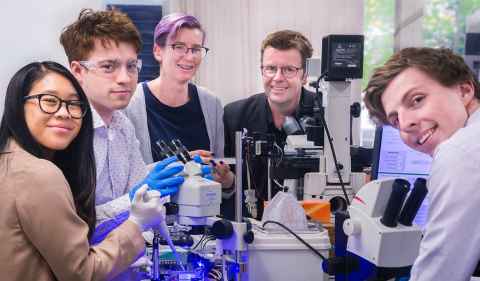Taking heart research to a new level
31 October 2019
Associate Professor Andrew Taberner of the Auckland Bioengineering Institute and the Department of Engineering Science has been awarded a James Cook Fellowship to develop a 'dyno' for the heart.

Dr Taberner will use the Fellowship to develop a new high-throughput instrument for measuring the performance of contracting heart cells. High-throughput screening instruments are those that can automatically perform many experiments in quick succession, or in parallel, and thus address biological questions that are otherwise unattainable using slower conventional methods.
The heart is complicated, and comprises billions of cardiac muscle cells which coordinate their contractions to pump blood around the body. One cardiac muscle cell is not necessarily like another; their behavior varies throughout the heart, and can deteriorate when the heart is diseased.
A better understanding of the performance of heart cells in different contexts could provide opportunities to develop new treatments for diseases affecting the heart. However, the process of making mechanical measurements of isolated heart cells is currently painstaking and slow.
“We urgently need to develop new high-throughput technologies and tools to speed up the measurement process,” says Dr Taberner.
Andrew has developed the world’s most sophisticated instrument for measuring the mechanics and energetics of cardiac muscle.
His Fellowship, from the Royal Society Te Apārangi and worth at least $220,000 over two years, will help him and team develop a cutting-edge device with which to study living, contracting cells harvested from the heart.
This will include 3-D bioprinting of isolated cells in a format that allows rapid testing of their properties. In his James Cook Fellowship, he and his team will develop a cutting-edge device with which to study living, contracting cells harvested from the heart. This will include 3-D bioprinting of isolated cells in a format that allows rapid testing of their properties.
This project will involve the development of new bio-printing technologies, image processing methods, and new miniature cell-testing devices. The research team will bring these together in a system compatible with tools currently used in biological research and in the pharmaceutical industry.
This device will be useful for many other types of cells. In food science, for instance, scientists could use it in the development of new forms of ‘laboratory grown’ meat.
“Andrew has developed the world’s most sophisticated instrument for measuring the mechanics and energetics of cardiac muscle,” says Distinguished Professor Peter Hunter, director of ABI. “The award of a James Cook fellowship is both an acknowledgement of his achievement and a wonderful opportunity for him to focus on further enhancements and new applications of this technology.”
Being awarded the prestigious James Cook Fellowship has become something of a tradition at the ABI and the Department of Engineering Science, having previously been won by Professors Poul Nielsen (2010), Martyn Nash (2008), Andrew Pullan (2002) and Peter Hunter (1999).
Dr Taberner will be working with collaborators at the University of Auckland, University of Otago, Massachusetts Institute of Technology, and the University of Twente, and a talented team of local students and researchers. “Together, we hope to develop technology that could transform heart muscle research and drug discovery,” he says.
Dr Taberner is one of only four recipients of a James Cook Research Fellowship this year, with two others at University of Auckland; Professor Alexei Drummond in the Faculty of Science, and Professor Mark Vickers of the Liggins Institute.
Media contact
Margo White I Media adviser
DDI 09 923 5504
Mob 021 926 408
Email margo.white@auckland.ac.nz
Want to help us make a difference?
There are many ways you can make a difference and support the Auckland Bioengineering Institute - you can make a donation or bequest, or even subscribe to our newsletter.